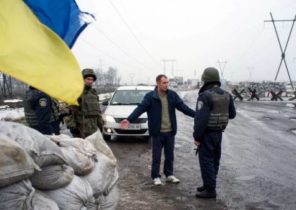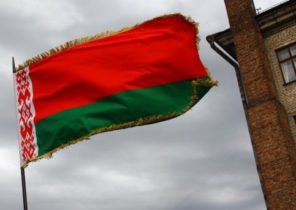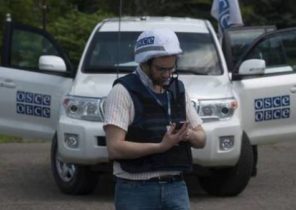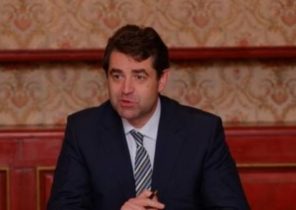August 9, was celebrated the 75th anniversary of the atomic bombing of Nagasaki — one of the last significant acts of the Second world war, the second and last nuclear attack in the history of mankind.
The explosion over Nagasaki bomb, codenamed “Fat man”, was killed from 39 000 to 80 000 people, with about half of them within 24 hours after the explosion. The city center was literally razed to the ground, it remained standing just a few of the disfigured buildings.
As a result of the atomic bombings of Hiroshima and Nagasaki died from 129 000 to 226 000 people, the vast majority of them civilians. Then it was claimed that the bombs were the only way to conclusively defeat the armed forces of Imperial Japan who fought desperately against the allies for every inch of Japanese territory.
It was thought that the alternative was a complete conquest of all the Islands of Japan. American strategists believed that such operation will result in the loss of up to 1 million American soldiers, not counting the losses of the allies, Japanese troops and civilians.
A quick end to the war saved the lives of people across Asia, where continued fighting. In China, Korea, Vietnam, Indonesia and other countries, Japanese troops were still fighting on the upcoming Federal and local armed forces. The atomic bomb, claimed the supporters of the bombing saved many lives.
This view remained dominant throughout most of the postwar history, despite the fact that views on whether the atomic bombing war crimes or not, have changed. Japan surrendered on 15 August and signed the instrument of surrender in three weeks after a bomb explosion in Nagasaki, thus ending almost a decade of global conflict, which killed about 73 million people.
But not all agree that the bombs were necessary. Miyako Taguchi is the daughter of a-bomb survivors, (such people are called hibakusha), who lived in Nagasaki at the end of the war. She now lives in new York, told Newsweek magazine that was born and raised about 30 minutes away from the epicenter.
In childhood she had suffered greatly because of this tragedy and recalls the significant role those events played in the life and history of Nagasaki. Taguchi even remembers how hot and humid summer days, it made her think about the incredible heat of an atomic explosion and what feelings must have been the one who fell under his blow.
When Taguchi got older, then, according to her, she better understand what happened to her hometown and her parents. She realized the horror that befell them, the horror of which her family did not want to remember. Each year, says Taguchi, on the approaching anniversary of the atomic bombing, those feelings again and again overwhelm her.
Taguchi said in an interview with Newsweek that he considers the atomic bombing as “inhuman,” despite allegations that hypothetically she saved the lives of people in other countries. According to the woman, when she hears some of then justify the use of atomic bombs, she is struggling to hold back and control their anger.
But Miyako Taguchi recognizes that not everyone agrees with her emotions and that people’s views on such a controversial subject can take root very deep. However, Taguchi believes that by sharing the story of her family, she hopes to encourage some people to reconsider their opinion on the need then of a nuclear attack on Japan.
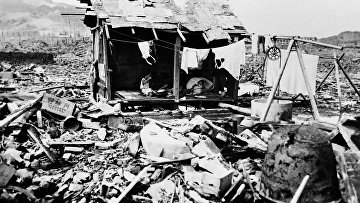 © AP Photo, Family of Nagasaki in a hut built on the site of their destroyed houses from the wreckage
© AP Photo, Family of Nagasaki in a hut built on the site of their destroyed houses from the wreckage
“It is very difficult to change the point of view of other people,” she says, ” especially when they know little about what actually happened that fateful day.”
In evaluating the history of the Second world war — at least in the West — the prevailing view about the horror that has fallen on Japan nuclear explosions. But forget about the Declaration of war by the Soviet Union of Japan at midnight on 8 August 1945 — a few hours before had been destroyed Nagasaki.
According to Tsuyoshi Hasegawa, the American historian of Japanese origin and a major expert on the history of the USSR, Russia and Japan, “the final nail in the coffin of a military of Tokyo” were not likely the U.S. atomic bombing, namely the entry of the Soviet Union into the war against Japan.
Hasegawa notes that in the final stages of the war, Japanese leaders sought the Soviet mediation in the organization of negotiations with the United States. This occurred even after the first atomic bomb killed tens of thousands of people in Hiroshima.
“The bomb in Hiroshima had not changed Japanese policy toward the Soviet mediation, we were told Hasegawa. — So in this sense it was the deciding factor… I’d say a much more important factor has been the entry of the Soviets into the war.”
“The Soviet Union was the last hope of the Japanese government to end the war, he added. And this hope was completely broken”. If the Soviet Union had not entered the war with Japan, “I think the Japanese government continued to seek Moscow’s mediation”.
Emperor Hirohito accepted the “sacred decision” to surrender early on the morning of August 10. After the entry of the USSR into war with Japan, military and political leaders of the country throughout August 9 discussed the fate of the country. The Emperor told the citizens to surrender only on 15 August.
Hasegawa believes that the nuclear explosion in Nagasaki was not the main factor that influenced the Emperor’s decision, as the full scope of the destruction and casualties from it was not known until 10 August.
The explosion in Nagasaki were concentrated in the valley of Urakami (there was a town centre — approx. TRANS.). The surrounding hills protect those areas of the city that lay behind them. There was located the headquarters of civil defense of Nagasaki, who sent the first message about the explosion. “However, during the August 9, Tokyo was not properly informed about the devastation of Nagasaki,” says Hasegawa.
Another point of view, explaining the decision about the atomic bombing of Japanese cities, is that they were not necessary for the application of the military defeat of Japan. Just then the US government wanted to show the Soviet Union that is capable of their weapons of mass destruction.
In the later stages of the Second world war has unfolded the war is “cold”. After the defeat of Nazi Germany in may 1945 the West and the USSR were already looking at each other through what later became the iron curtain. At that time USA was the only country which had atomic weapons, and American leaders wanted their new rivals knew about it.
Of course, the atomic bomb has had some effect on more speedy end to the war. But they are mainly meant to prevent the Soviet attack on Japan and seizure of new territories. The Soviets used the newly conquered countries in Europe and Asia as its allies in the cold war, and President Harry Truman and his administration wanted to minimize Soviet territorial gains.
Hasegawa considers that the accepted evaluation of the atomic bombings in the United States and in much of the Western world comes from the fact that the bombs were necessary to put Japan on its knees. He believes that this view has gained popularity and recognition mainly for psychological reasons.
“The use of atomic bombs really bothered the conscience of Americans is the psychological factor, he says. Americans want to believe that what they did, that terrible, what they did was really necessary.”
Hasegawa also believes that the prevailing world views of the history of the Second world war are too focused on the United States that allows American interpretations of “grow deep roots” without encountering serious resistance. According to him, many American scholars cite the Soviet Union as a kind of “supporting role” and write the story of the atomic bombings, not particularly taking into account the actual process of making Japan’s decision to surrender, which in reality took place.
Tsuyoshi Hasegawa — known American historian of Japanese origin (born in Tokyo, graduated from Tokyo University and currently Professor at the University of California, Santa Barbara, author of numerous works on the history of Asia, Japanese-Russian relations and Russia). One of his major works “the Race for global influence between Stalin and Truman” (1996) won the 2006 Great prize of the Association of American historians (Robert Ferrell Award).
Comments of American readers
rst
There is an excellent BBC series about the Second world war called “World war”. The series uses interviews with those who actually took the decision at the time, with allies and with members of Hitler’s “axis”. All Japanese military commanders said during the war that Japan was not going to give up. Actually there was a plot to kidnap the Emperor to prevent him to make the decision on surrender. Themselves Japanese leaders argued that the bombs saved more lives than they took. And all this from an interview of 1945-1946, without historical revisionism we so often see, including in this article. I am a historian. Study historical data, stick to historical facts. They show us the true story. Time, demanded from Harry Truman to end the war with minimum loss of Americans. According to the Japanese, the bombs saved lives and ourselves.
Jucifer
And it was necessary for the Japanese to bomb pearl Harbor?
Hermano
This woman (Miyako Taguchi) talks about the “inhumanity” of the bombing. I would like to ask her how many she knows about the inhumanity of the Japanese against the Chinese? Maybe she should listen to stories about the Nanjing massacre survivors of the witnesses?
Flogician
It’s not just about China. Millions of people throughout the Asia-Pacific region was subjected to torture, violence and barbaric treatment by the Japanese military.
makie
And for the Japanese soldiers was necessary to kill and rape my great-grandparents in Nanjing?
Christopher Anderson
The question arises. Whether you need the Japanese attack on pearl Harbor? Let’s not forget who was the aggressor. Let’s not forget about all the atrocities that the Japanese military did at that time across the Pacific and Asia. Ask the Chinese victims of the Japanese occupation. No need to torment himself with doubts. Then, 75 years ago, the whole world fought against FASCISM.
George
Japan could have surrendered after Hiroshima, and to the point. The USSR and Japan had a non-aggression Pact, and the Soviets did not help US in the war in the Pacific!!! The Soviet Union declared war on Japan just because he wanted to take his share in the country, as he did in Germany. General MacArthur did not allow Soviet troops to occupy Japan, and Russia still occupies Japanese Islands! Why don’t you tell the whole truth!
Exmedic113
Where is this Taguchi sense of Holy indignation, when the Japanese forced thousands of Korean women to be prostitutes during their military units? When the massacre in Nanjing? When he carried out the attack “on the sly” on pearl Harbor, which killed civilians? Drove the prisoners on a death March to Bataan? When forced allied prisoners to work as forced labor, without food and medicines, which led to their mass death? This is not hypothetical arguments.
bobly
Don’t blame the Americans. Blame the Japanese. The Japanese were the aggressors. Blame the Japanese army, politicians, Cabinet Ministers, Hirohito, Tojo, the military police “Kempeitai”… the Japanese have nobody to blame but themselves as the aggressors. Let’s face the truth, the Japanese common people are thoroughly brainwashed and used as pawns. The Japanese fired the first shot, and it is good that they have done recently.
fisherman1
The Japanese have short memories, the torture of prisoners of war was nothing short of barbaric and inhuman acts. A “scientific” studies on humans using increasing pressure until, until they burst eardrums… It’s just disgusting!
zoid
Nagasaki was the most important object, and the bombing was necessary. Stupid and selfish Japanese military distorted information on every corner that does not decay war, no matter what price she had been given… They did not allow the thought that America has the second bomb; to do it meant to acknowledge that the war is hopeless. They acted, being ready to sacrifice the whole nation, but not to give in to the ongoing war.
maybe
America could have been only one: drop the third bomb on Moscow.
warpig
There is no doubt that the Japanese deserved the second bomb. At least in order that they are aware of: it will be a third and fourth… that’s why they so quickly surrendered. And if America dropped then only one bomb, then I would not have us to answer the question: why only one? The title is stupid.
Polymath129
My God, Russian trolls are everywhere!!
Purple Pinecone
The answer to the title question: “Yes!”



